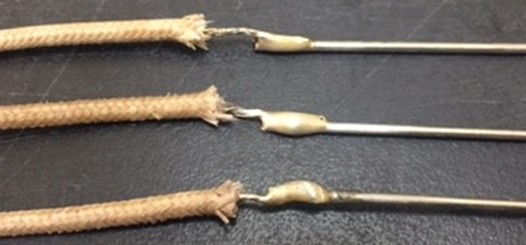Curing Material on an Aluminum Mandrel
Objective Heat a customer supplied aluminum cylinder to 80-120°C for a material curing application. More application notes
Processes
Processes: More
Processes: More

Industries:
Industries: More
Industries: More
Industries: More

Products:
Products: More
Services:
Services: More

Learn:
Learn: More
About:

1 min read
Brett Daly
10/29/18 3:19 PM

A client had been brazing a nickel pin and a braided nickel wire with a torch. They turned to THE LAB at Ambrell to recommend a process for brazing with induction heating. The client wanted to take advantage of induction's benefits, including repeatability, safety and speed. The end product from this application is a heater assembly.
THE LAB determined that an Ambrell EASYHEATTM 2.4 kW, 150-400 kHz induction heating system would be the right system for their requirements. They designed a single position multiple-turn U-coil for this application. Testing showed it takes 25 seconds to heat the assembly and create a brazed joint, which met the client's requirements.
When compared to torch heating, repeatability is a key benefit. With a torch, you're dependent on the operator's skill, whereas with induction you get the same result every time. Safety is another considerable benefit, as there's no open flame in the work environment. And, of course, induction is a fast, precise heating method that requires a minimal footprint. 

Objective Heat a customer supplied aluminum cylinder to 80-120°C for a material curing application. More application notes

In today’s manufacturing landscape, efficiency, precision, and sustainability are critical. Induction heating—a process that uses electromagnetic...

When it comes to many manufacturing processes, including this forging application, precision and efficiency are critical. Traditional heating methods...